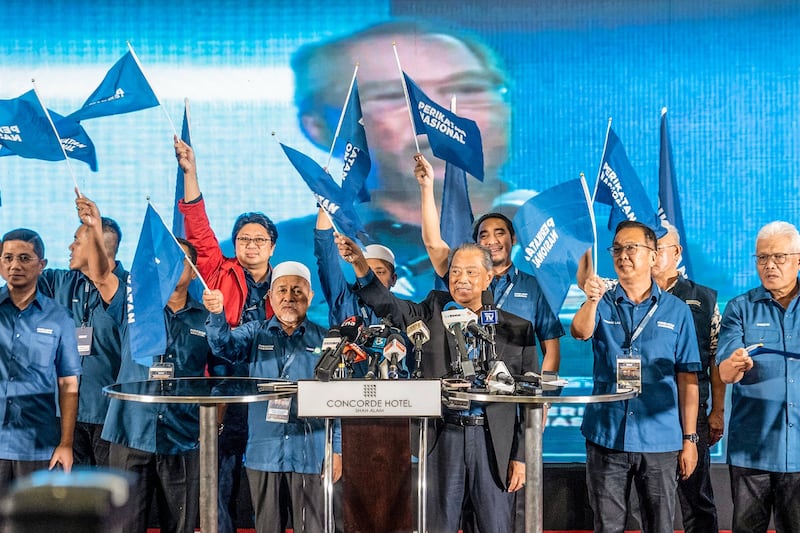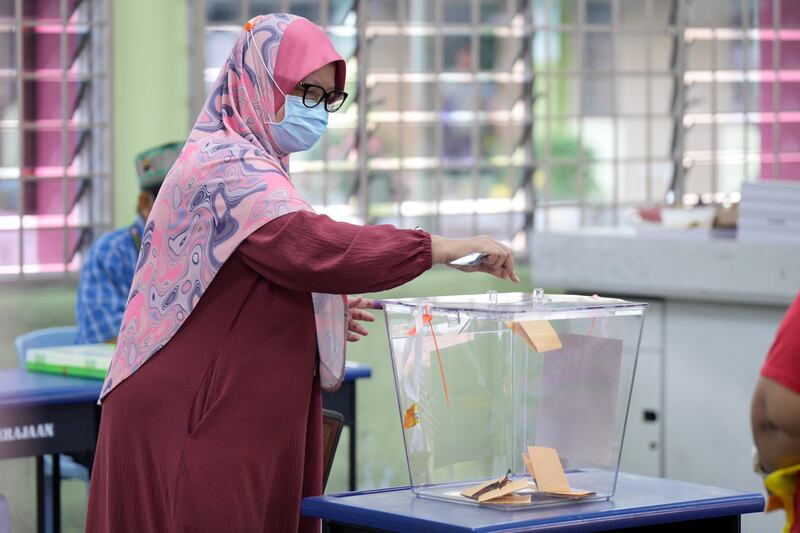Significant gains scored by Malaysia’s opposition in weekend state polls show that Malay Muslims have largely turned away from Prime Minister Anwar Ibrahim’s federal alliance although his coalition retained control of three states, analysts said.
His government won a reprieve, but to expand its base it now needs to lift up the poorer ethnic Malay majority and ensure that minorities are not demonized, because the ethno-religious opposition relies on mongering fear about the majority losing its Islamic identity, analysts added.
In Saturday’s six state assembly polls, the conservative opposition Perikatan Nasional vastly improved its performance in the states it retained – Kedah, Kelantan and Terengganu. It also took a chunk of votes away from Anwar’s federal alliance in the states which his Pakatan Harapan alliance held on to – Selangor, Penang and Negeri Sembilan.
“A significant portion of Malay voters who shifted to Perikatan Nasional and its constituent, the Islamic Party PAS, may have done so in protest of the economic conditions, while others have completely bought [into] the Malay identity politics agenda sold to them,” Ibrahim Suffian, director of the Merdeka Center, a Malaysian pollster, told BenarNews.
“Pakatan Harapan cannot match Perikatan on identity politics. Instead, it needs to deliver on fundamental economic recovery and some institutional reforms that will make the government more responsive to issues and improve governance,” Ibrahim told BenarNews.
Institutional reform must address corrupt practices and boost efficiency, he said.
“Reforms in the subsidy regime and taxation are needed to boost government revenue so it can be directed to deserving sectors,” Ibrahim said.
Anwar should not try to match Perikatan’s identity politics or appease conservatives, according to another analyst, Syaza Shukri, of the International Islamic University of Malaysia.
He should focus on “carving the unique selling point of an Islamic government that celebrates all,” Syaza told BenarNews.
While the outcome of the six state elections were not expected to directly impact the federal government with its two-thirds majority, the results were seen as a test of the federal alliance's strength.
The state polls were also the first major test of confidence in the unlikely alliance of Anwar's multiethnic Pakatan and its former foe and Malay-centric Barisan Nasional-United Malays Nationalist Organization (UMNO) combine.
Results show ‘polarization’
In the end, Perikatan and Pakatan each retained three states, but the devil was in the details.
Up for grabs were 245 seats in total – Perikatan won 146, or 60% of the seats.
The Pakatan-led alliance won 99, down from the 169 seats the parties in the alliance won in the previous election.
These numbers account for how in previous state elections, Perikatan’s parties Bersatu and PAS did not contest together, and neither did Pakatan and Barisan-UMNO.

In Penang, a Pakatan stronghold for years, Perikatan this time won 11 seats.
In Selangor, the state that encompasses the Malaysian capital region, the Perikatan-PAS alliance made major inroads in both non-urban constituencies with predominant Malay populations and in urban areas.
It won 22 of 56 Selangor seats together, compared with the one seat that PAS one in the last election.
PAS was not a part of Perikatan back then, but still the number of seats won by Perikatan was unexpected, said Tunku Mohar Mokhtar, of the International Islamic University of Malaysia.
“While it was also predicted that Perikatan would increase its seats in the Malay-majority constituencies, the scale of its success, especially in denying a two-third majority to Pakatan in Selangor, is quite shocking,” Tunku Mohar told BenarNews.
The results show “how polarized Malaysia has become,” he said.
Ethnic Malays make up close to 70% of Malaysia’s population, and all of them are Muslim. Ethnic Chinese comprise 22.8% of the population, and ethnic Indians 6.6%.
‘Green wave’ again
Perikatan’s tally got a shot in the arm from the performance of its coalition party, the hardline PAS, mirroring the results of the November general election.
PAS, which is often accused of divisive religious rhetoric and pushing Islamic fundamentalism in multi-religious Malaysia, turned in what analysts say is its best performance ever.
It won 105 of the 127 seats it contested across six states, of a total of Perikatan’s 146 wins.
In the November general election, PAS won 49 parliamentary seats, the largest number by any party, and holds a majority of Perikatan’s 74 seats. Analysts had called it the “green wave,” after the color of PAS’ flag.
In a statement on Monday, PAS Secretary-General Takiyuddin Hassan noted that the party retained the states of Kedah, Kelantan, and Terengganu with a two-thirds majority of votes “and achieved great success in the other three states” governed by the Pakatan-Barisan coalition.”
By contrast, Barisan-UMNO was demolished again, showing that Anwar cannot rely on it for Malay Muslim votes. Of the 108 seats Barisan-UMNO contested it won a paltry 19.
UMNO fared poorly in the last two national elections as well, battling the perception that it is self-serving and corrupt. Its senior leader, former Prime Minister Najib Razak, was convicted of corruption and sentenced to 12 years in prison in 2020, and that conviction was upheld last year.
Once considered the flagbearer of Malay-Muslim interests, UMNO appears to be a spent force, Azmil Mohd Tayeb, associate professor at Universiti Sains Malaysia, told BenarNews
“Perikatan is now the political vehicle of choice for the Malays, replacing UMNO,” he said.
“Hence its competitiveness not just in the Malay heartlands but also urban and semi-urban areas where the population is mixed. Perikatan Nasional is the new Barisan Nasional.”
Calls to step down
Perikatan leader Muhyiddin Yassin, a former prime minister, said late Saturday that his alliance’s performance signified a rejection of the federal alliance and UMNO president Ahmad Zahid Hamidi.
“Anwar Ibrahim and Zahid Hamidi must take moral responsibility and resign from their posts,” he said in a press conference.
Additionally, there is growing clamor within UMNO calling for Zahid to resign as party president. He faces 47 criminal charges in a case related to the alleged misappropriation of 52.25 million ringgit (U.S. $11.42 million) from his family-owned foundation.
“UMNO lost 100 per cent of seats in Terengganu. Ahmad Zahid should resign,” a former Terengganu Chief Minister Idris Jusoh from UMNO said in a Facebook post on Sunday.

A younger UMNO leader, Muhamad Akmal Salleh, said it’s time for the party to embrace change courageously.
“Carrying the voice of the people needs to be prioritized, not the voice of the leader, we need to dare to change, if we don’t want UMNO to continue to be forgotten,” he said in a statement.
A long-time watcher of Malaysian politics, Bridget Welsh, said UMNO needed to do some serious soul searching following the state poll results.
“[UMNO] has to make key decisions on leadership change, internal reforms, accommodation of purged factions/individuals and its alliance relationships,” Welsh, of the University of Nottingham Malaysia, told BenarNews.
“Zahid will be pressured in the next few weeks to take responsibility for the state elections defeat.”
